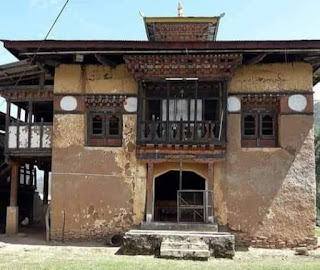EPIC BATTLE | Kabji Choub Vs Jang Megoe Drau
Kabji Choup had an epic arm-wrestling (Sheyrey Paarey) battle with Jang Megoe Drau. At that point in time, Megoe Drau had remained undisputed until Kabje Choup rose to his popularity for his unmatched strength. Choup was an underdog and physically did not look that huge, fearsome and oppressive as Drau did. Folklores say, offsprings (illegitimate children or bastards) of Ap Genyen Jagpa Melen (one most revered deity of the west) looked usually skinny and fairly tall. In contrast, as known by the name itself, Megoe Drau (Yeti alike) looked gigantic and commanding. He was also known for his insatiable appetite and ability to devour ‘khule’ piled half his height, just in a single meal. He was an offspring (bastard) of Ap Muktsen of Trongsa.
The then Trongsa Poenlop (yet to confirm this name) and the Thimphu Dzongpoen (unknown) happened to put forth their strongmen for an epic arm wrestling battle. Thimphu was represented by Kabji Choub whereas Trongsa was represented by Jang Megoe Drau. The combat took place in Trongsa near the Dzong.
It was Kabje Choup’s turn to hold the arm of Megoe Drau. As the wrestling began, Megoe Drau effortlessly lifted Choup, swung him in the air three times, and as if he weighed nothing, released him far off. With a heavy thud sound, Kabje Choup landed on the opposite of stream (present day archery range). Right away, Megoe Drau celebrated his win by humiliating Kabje Choup. He shouted:
“How do you feel like being thrown away that far?
Kabje Choup responded with a humour: “How you feel like losing an arm?” And showed the ripped off arm from the other side.
When Megoe looked at his arm, it was missing. Choup’s grip was too strong that he did not let his arm slip away even though his physic and general strength did not match that of Megoe Drau. Kabje Choup was declared the ultimate winner.
The battle between Megoe Drau and Kabji Choub wasn’t the lone contest. Such competitions had happened occasionally and winners were back and forth. Sometimes, drangs of Ap Geynyen won, and sometimes did the drangs of Ap Muktsen and Chungdu.
Kabji Choup, however, didn’t have a peaceful life. He was frequently dragged into such contests and had to toil under Thimphu Dzongpoen. Some sources say, he escaped the court of Dzongpoen and spent the rest of his life hiding in Kabesa.
It was believed that the bastards of Ap Geynen were usually notorious, tricky and sneaky whilst the bastards of Ap Muktsen were strong, wayward, oppressive and uncontrollable. Ap Chungdu of Haa valley also had many illegitimate children of similar strengths and power.
In those days, nyagoes (strongmen), especially the bastards of said deities posed huge threats to the rule of local leaders and one of the strategies used by the Chieftains like Desis, Poenlops and Dzongpoens were to lure them into arm wrestling (sheyray paarey), waist wrestling (kayshey), sword combat (ge-khey) and bull-fighting. The intend was to eliminate those wayward strongmen strategically. Otherwise, their lives were at risk having them around. Challenging them directly wouldn’t be possible as they were not just physically strong but also had the invisible hands of their deity fathers playing on their side. Thus, such combats were one effective and necessary tool to stop the ‘drangs’ from rising to power.
There is a record of Lam Osen Tshering Wangchuk (18th Century) literally negotiating with Ap Muksen of Trongsa to stop him from impregnating women in the valley of Mangde. Lam arranged Aum Tashi Yangzom, another deity of Kheng Dakpai of south Trongsa for his wife and since then Muktsen’s illegitimate fathering stopped. As promised, Lam also built a goenkhang for Ap Muktsen at Boemji Choeji Ngatshang in Bemji to appease him. (Source: Bonbji / Bemji Choje Nagtshang by Sangay Phuntsho). Two of the well known bastards of Ap Muktsen beside Megoe Drau were Garb Lungi Khorlo and Bjib Pungdhola, some oral sources say. How and when did Ap Geynyen and Ap Chungdu stopped their misconducts of fathering illegitimate children were less known.
(Picture courtesy: Mr. Pem Tshering, BBS)



Comments
Post a Comment